
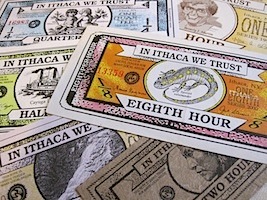
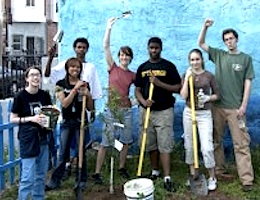

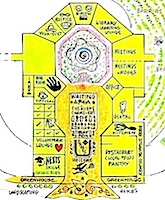


 |
 |
 |
 |
 |
  |
| PAUL
GLOVER ESSAYS: community
control of food, fuel, housing, health care,
planning, education, finance. |
| HOME | INTRO | CURRENCY | SUCCESSES | HOW-TO BOOK | PUBLICITY | ESSAYS |
|
Soft Landing
for the Middle Class by Paul Glover, August 2013 Perhaps you're resting comfortably with your laptop, digesting a good meal or relaxing before friends arrive. Your solid job secures a fine home, a reliable car, vacations, and the latest digital bling. Your pension is rock solid, your portfolio climbs. If so, you're afloat atop history's rarest bubble, the American middle class. Carried aloft for sixty years upon the currents of strong dollars, cheap oil, roaring manufacture, tough unions and vast empire, American consumerism became the model for most of the world. But this sparkling orb is being cracked by global competition, national debt, deindustrialization, resource constraints, and military blowback. Millions of homes are splattered with pay cuts, debt, crime, foreclosure. The global economy now produces more American losers than winners Twenty percent fewer Americans are middle class today than in 1971. Families in middle income neighborhoods have retreated from 65% to 45% since 1970. In 2011 alone, 129,000 millionaires lost it all., Over 15% of us (not you) are on Food Stamps. The middle class, long the single measure of success, respect and independence, cherished by liberals and conservatives alike, will notwithstanding not roar back, will not bounce back, will not climb or crawl back. The pilot and co-pilot of economic recovery-- Wall Street and Washington-- have bailed out. Alan Greenspan admitted to Congress (10/23/08) that "the critical functioning structures that define how the world works" are "flawed." Theorems on blackboards cannot solve current macroeconomic problems. They no longer reliably employ, feed, fuel, house, heal or educate us. Increasingly, if you're still winning you occupy an oasis of money, surrounded by talented, hard-working people who have lost homes, savings or income, surrounded by fences, to keep the losers out. Though we might prefer that good times continue exactly as before, massive transformation stalks us all. As usual, the future will be different. The next winners will be those who soonest acknowledge that the middle class is dissolving. America's middle class made itself vulnerable by defining success as possession of stuff rather than possession of power. Specifically, workers indentured themselves to banks, for homes and cars; unions drifted from heroic to greedy, focusing more on high pay than workplace control; shoppers voted with their dollars for cheap imports, sending jobs and capital abroad; voters accepted candidates dedicated more to money than to constituents; schools failed to prepare for swift change. WHAT IS TO BE RESTORED? Certainly, when reaching a cliff, progress is not simply forward. As serious unrest spreads, Middle America will be replaced either by something horrible, or something better. Horrible is easy to describe: look at any apocalyptic movie, where there are not enough gates and guards to defend against famine, contagion, revolution. Your children would pick tomatoes on plantations or potatoes from garbage; they'd shoot then eat their neighbors. By contrast, a secure future is less vivily understood. If we learn from history's excesses, solutions will be rooted in a proven practical American tradition that is neither heartless capitalism nor bleeding heart socialism. It might be called mutual enterprise. Constellations of regional businesses profit for the sake of community, while member-owned nonprofits. meet basic needs at least cost They thrive on friendly creative competition within community solidarity. As a prime example, "B Corporations" in several states now permit directors to serve social and environmental benefit rather than maximum profit only. Today, rather than wait to be pushed aside, many are leaving the middle class deliberately. They take center stage. They expect more than a paycheck. Some of these folks were high achievers. You've read their stories: after two PhDs, she buys a farm and now sells goat cheese and birdhouses at the farmers' market. These little revolts are but a symptom. There are millions of related businesses and nonprofit organizations that lead/exemplify the shift toward reliable abundance. They're creating the jobs that make revolution orderly. This article now becomes a suggestion box. Those who are convinced that this bubble is a diamond may flip the page, or revisit when useful. Prescriptions for vast change, especially wholesome ones, are easily dismissed as utopian, even when presented as balanced fiscal transitions and based on existing programs. The good news is that deep environmental and infrastructure crises require us to rebuild America, entirely. Every stick and brick. To retrofit millions of houses so that they're pleasantly heated and cooled by seasons rather than fossils. To meet needs in walking distances. To reduce waste to zero. The better news is that rebuilding America's cities, suburbs, and farms will fully employ the next ten generations of construction workers, scientists and artists. Every skill can serve. We will fill workshops, too, making modern tools that cut the costs of housing and fuel. We'll thereby cut crime to a fraction, since jobs fight crime. We'll empower the poor to prove their capabilities, while generating unprecedented profit. There's plenty work ahead, to make the poor wealthier and the wealthy reliably secure. The best news is that rebuilding America will create cities that are as beautiful as the children within them. Our cities will be the model for the world: earthquake-and-tornado-proof, flood-proof, drought-proof, radiation-proof, famine-proof. Transition plans unfurl gracefully within the dominant reality, by installing and then connecting fragments. Simultaneous reconfiguration of core infrastructures will take decades, requiring trillions of dollars investment. Such a bold national project will enable us to swim together rather than sink together. Conservatives and Liberals are invited to rise from ideological trenches to make life easier for us all. We'll erase the national debt. We'll restore national pride. RISE OF THE MUTUAL CLASS As a nation of cowboys, we're often reluctant to collaborate. We've been taught to sink or swim alone. But, the new routes toward independence will prepare what I call the mutual class. Especially key in the nonprofit sector, are member-owned mutual aid systems. One hundred years ago, one third of American households were members of "benevolent societies." They pooled money and labor to meet needs. Paying pennies per week, members built and owned genuinely nonprofit hospitals, orphanages and old folks' homes. Hundreds of such "fraternal benefit" groups-- funny-handshake buddies like the Shriners, Moose, Elks, Odd Fellows-- were the original medical insurance companies. Farmers organized electric co-ops that brightened rural nights. They owned general stores, warehouses and granaries. Together, these mutual aid associations became an essential precursor to the middle class itself. By lowering the costs of living Americans gave themselves raises. Resulting discretionary income freed them to patronize neighborhood businesses, which incubated chain stores. Working class families asserted individuality through competitive consumption. And now, adapted for our times and temperament, the mutuals are needed again. We step from the treadmill of debt to take control of life.. BIG NEEDS LITTLE Healthy macroeconomies depend on the vitality of village and neighborhood economies, just as healthy lungs depend on the vigor of millions of tiny air sacs. That's because major markets-- like cars, airplanes, bicycles and computers-- are invented in garages rather than skyscapers. And because social chaos and raging poverty are bad for most business. Lately, when sudden change intrudes, all of America's institutions have become too big to embrace significant change. Like sumo wrestlers in a basketball game, they move too slow. Big Government, Big Oil, Big Insurance, Big Med, Big Media, Big Finance, Big Ag, Big Highway, Big Education, Big Military, Big Prison, Big Police, Big Poverty. Millions of us are employed by giants that dominate policy and culture. As a result, the job base has been based increasingly on managing tragedy, thus resists solutions. What would happen to the job base were Americans to eat healthy food and exercise; to drive safely or take transit? What would happen were we content with what we owned? What if criminals went on strike and refused to commit crimes? Yet hereafter the foundations of reliable economic growth are energy efficiencies, regional food and fuel, water conservation, preventive health care, alternatives to the automobile, ecological housing, local manufacture and trade. The humble tools for this conversion include hyperinsulation, earth-bermed co-op dwellings, solar and wind energy, urban greenhouses and orchards, treefree paper, bicycles and trains, farmers' markets, coop health care and local currency. Though some of these upstart markets may appear to compete with dependence on Big Mart, long range benefits are great Small undergirds Big like seeds prepare harvest. Together, classes must now combine to reorganize society. Through its precepts, the poor become responsible and proud; the rich savor interesting lives connected to community; the middle class create more than we consume. Cleaner water and air lead to healthier public, and from healthier public to healthier you. Likewise, with less crime, more liberty. Wiith more wealth, less welfare. Our challenge is thus to create banks, moneys and markets that reward us all, satisfactorily, for producing durable useful goods and providing essential services. member-owned banks that invest most money back to the neighborhoods from where deposits came. LITTLE NEEDS BIG To meet the credit needs of the mutual class, a thousand new regional stock exchanges would abide new standards. These will gather capital of all kinds for eco-development. These would focus on technologies that lower the costs of living for food, fuel, housing. Investment in them plants a painless path from the tragedy economy toward profit in the mutual economy. From two dozen original American stock exchanges, a handful remain. Long gone are Buffalo, Colorado Springs, Denver, Hartford, Honolulu, Louisville, Milwaukee, Richmond, Salt Lake City, Seattle, Spokane, Wheeling. Several others, like Baltimore, Chicago, Cncinnati, Cleveland, Los Angeles, Minneapolis, New Orleans, Pittsburgh, San Francisco, St. Louis and Washington, D.C, merged to form larger exchanges: The federal study "Local Economic Development Tools" concludes that expansion of local firms through import replacement programs can generate ten times more jobs than imported capital. 90% of new jobs are created by local business. Therefore businesses would be selected which rely on technologies manageable by neighborhoods rather than centralized expertise, and which reduce pollution Businesses would be selected which transfer economic power to community, rather than agencies which help the poor stay poor They 'dbuild relevant skills. They convert capital into harmless and beneficial efforts. It provides basic benefits for all, and special benefits for investors. Transferable equity in community enterprises that provide secure sources of food, fuel, and housing. Interest earned is community interest, in order to provide investors with immediate return-- food, health, housing, keys to city, gratitude, inheritance, retirement security, in the form of negotiables, bonds, services, goods. Among the new trading floors one imagines CHASE-- the Chicago Area Stock Exchange; PRAISE, the Philadelphia Regional & Independent Stock Exchange; HORSE, the Houston Regional Stock Exchange; WISE, the Whole Ithaca Stock Exchange; LASER, the Los Angeles Stock Exchange Revival, and so forth. |
At
the same time, a city that depends strictly on dollars
will not have enough money with which to employ everyone, pay fairly,
expand health clinics and transit, staff schools, repair water mains,
support businesses, and plant trees. So credits are
issued that boost
specific projects. Thus investments may be made with capital other than dollars. Regional bonds/notes redeemable for services and goods Monetizes tools, skills, crops, soil, volunteer hours, labor hours, development rights transferred negawatts, restraint of childbirth, locally-made warranty It should be noted that regional currencies do not replace dollars; they replace lack of dollars. They augment the local money supply, raise the minimum wage, promote job creation, friendly trade, local business. More productivity assures less inflation. Seats on the Exchange would be elected by traders rather than purchased or appointed. The directors regulate transfers of negotiables/bonds among the programs as services available As opportunity and invention increase through these investments, there is more money available for producing goods and services that feed the transition from dependence to strength. Local and regional self-reliance give American communities added capability to reach to each other, with ecological export industry and travel. Hundreds of such programs give citizens genuine democratic power-- in the marketplace-- where it counts. RICH AND POOR UNITE What about the poor? Conservatives send them to war or to prison. Liberals send them to counseling. Both responses require big government. Both are expensive. The nation's income gap hobbles all of us, by requiring higher taxes to control crime; to subsidize housing, heating and electric; to fund Medicaid and Food Stamps. The typical large American city is built like a cash register. The people inside are just spare change. Some are dollar bills; most are pennies; their only function is to fill the till. But this inequity hobbles market expansion. Research shows that labor productivity and yearly business growth are highest in countries where income is most equal (Economist 11/5/94 p.21). We can can reduce the cost of living, and of government, by investing in neighborhoods directly. Rather than merely servicing and controlling poor neighborhoods, we gradually transfer economic power and land to them, through genuinely nonprofit mutual aid systems. Enormous new markets open as the poor become creators of beautiful cities. They move BEYOND CHARITY TO OWNERSHIP when they provide land and money according to this template. As an experiment, let's convert one block of houses from destitution to safety and full employment. Here's our budget: Calculate total cost to maintain one low-income city block: subsidies for Food Stamps, electric and gas, Medicaid, teenage pregnancy, neonatal congenital care, asthma and diabetes, family counseling, disability, unemployment payments, police, courts, jail, probation, remedial education. Calculate decreased costs also for street repair, street lighting and sewer maintenance. We prove that beauty and ecology are financially practical and culturally acceptable. This neighborhood becomes school and employer. As the model succeeds, MetroEco Contractors spread these avoided costs throughout the city. These allow neighbors to purchase high-quality, low-cost building supplies, insulation, paint, housewares, plants, health care, solar panels, food. Neighborhood land trusts and sweat equity stabilize housing prices and expand ownership. o WORKER OWNERSHIP NETWORKS support transfer of business ownership to employees. o INSULATION CO-OPERATIVES buy and install energy-efficiencies. o MATERIALS RE-USE CENTERS disassemble and stockpile components of discards, for resale and re-manufacturing. New buildings are constructed ecologically, using non-rainforest woods. order to help new small businesses form. These also expand the economy by reducing waste of resources and wealth. New Roles for Traditional Powers Several related adjustments are therefore needed to facilitate transitions: o GOVERNMENT power to shop locally and hire locals is a major green engine. Government's ownership of vacant lands and buildings gives regulators great power to empower neighborhoods. City Hall would amend building codes to encourage greywater systems, compost toilets and solar envelope zoning. o SCHOOLS would become exciting again by teaching all students how to become powerful community managers and creators of jobs, as well as active union and co-op members, rather than obedient drones. o MEDIA would use their cultural power to inspire trust and enthusiasm for the future, rather than fear and dread MUTUAL CLASS JOBS Rebuilding America so that we thrive during risky times will require that we create 40,000,000 transitional jobs. Mutual class jobs are generated by average people who work, who raise children, and who depend on the health of neighborhoods. These enable us to keep our homes and enjoyments while repairing society and nature. Regions make themselves powerful primarily by recycling their wealth, to magnify it. That means jobs retaining talents, skills, and money of local people in the community as much as possible, networking the community to take care of itself to the maximum extent possible. There's a high road for low tech. Virtually everything used in a locality can be made locally, by small energy-efficient shops that use regional resources (including components of discards), and which control and recycle all emissions and byproducts. Specialty materials shops (such as foundries & sawmills) can be linked to each other and to micro-industrial assembly shops. ENERGY-EFFICIENCY: reflective roofs, green roofs, solar hot water, photovoltaic electricity and streetlights, superwindows, insulation, windmills, EnergyStar refrigerators (basement preferred) and appliances, CF lightbulbs, basement retrofits for occupancy and cold storage, mulching leaves onsite for gardens. WATER EFFICIENCY: roof cisterns, drainage swales to orchards/gardens, greywater, low-flow faucets, waterless toilets, porous paving, street reclamation, depaving. Even today, thousands of high-quality household goods are produced locally for internal markets, such as soaps, shoes, clothes, rugs, drapes, food, toys, and furniture. Communities are busy providing food & food processing, compost, garden tools, clothes, hats, gloves, shoes, wool & angora goods, plant fibers, recycled fibers, lamps, tools, forges, herbal medicines and healing. These are the basics. As local production networks for micro industries become more extensive, and as the increase in local wealth enables more of us to afford locally-produced durables and household goods, the unit price for local artisanry and manufacture gradually becomes competitive with mass-produced imports. Locally-made goods are already competitively priced, when we calculate that buying local goods in locally-owned stores produces local jobs that save money by reducing unemployment's costs of social services, vandalism, drug use, violent crime, and jail. There are thousands more products for which regional and national markets could be found, such as trolley components & cargo bikes, insulation, transit, compost toilets, cleaning supplies, scrap metal reprocessing. You name it; such products can be made and exported without further contaminating our environment. All skills can be adapted to green enterprise. MICROLENDING makes small loans at low interest, Microlending has proven the superior safety of small loans to low-income people. MILITARY CONVERSIONS retrofit vacated military bases or weapons factories for nonmilitary jobs and production. REVOLVING LOAN FUNDS make money available at zero- or low-interest for specified purposes when prior loans are repaid. COMMUNITY SUPPORTED AGRICULTURE brings city folk to work on farms in exchange for fresh, low-cost food. BUSINESS INCUBATORS are buildings containing equipment shared by small new businesses, to reduce start-up costs. BUY LOCAL CAMPAIGNS promote social and economic benefits of shopping for locally-produced goods, at locally-owned stores. CO-HOUSING provides shared community spaces for child care, gardens, cooking and recreation, to make life friendlier and easier. FARMERS' MARKETS enable farmers and craftspeople to sell directly to local people. FARMLAND RETENTION groups advocate public policy that promotes and protects local farming. FLEXIBLE MANUFACTURING NETWORKS combine the skills and tools of several local manufacturers to enable them jointly to get a manufacturing contract. FOOD AND FUEL CO-OPERATIVES coordinate bulk buying of food, fuels, solar equipment and windmills by neighbors, to reduce unit coss and gain policy leverage. HOUSING CO-OPERATIVES remove housing from the speculative market, enabling occupants to resell with specified limits to profit. IMPORT REPLACEMENT PROGRAMS connect regional businesses and individuals to supply each other, rather than depending on imports. LAND TRUSTS purchase local land to protect it, usually from suburbanization as a base for affordable housing. LOCAL INSURANCE COMPANIES (locally-owned nonprofit insurers which invest all premiums regionally). including locally-controlled non-profit health financing co-ops. LOCAL PENSION FUNDS are locally-originated and controlled, much of whose capital is dedicated to local investment. LOCAL TAX CREDITS reduce local fees on organic farms, solar and wind energy, realizing that tax reductions will be returned via high sales tax revenues. CONCLUSION: What is to be fun? So imagine that, 30 years from now, America's new markets enable everyone to work a few hours creatively daily, then relax with family and friends to enjoy top-quality local healthy food. To enjoy clean low-cost warm housing, clean and safe transport, high-quality handcrafted clothes and household goods. To enjoy creating and playing together, growing up and growing old in supportive neighborhoods where everyone is valuable. And to do this while replenishing rather than depleting the planet. Let's look at a sample Mutual Day. We start with sex and music, then breakfast. We walk or bike to work, four days per week. After three hours work, we return home for a long lunch and sex, or we eat with co-workers: we discuss work plans, utility and durability of product, marketing, sales, prices and wages. Then two more hours of work. We have time and energy for an afternoon stroll or game, then prepare dinner, make music, make love (Why so much sex? Because we're relaxed). We finish with an evening stroll in our beautiful neighborhood. Looking even further ahead, towards the grandparenthood of your youngest living descendants, there will be little oil but we will be warm. There will be few cars but we will go faster to places more delightful. The most secure housing will be built substantially underground. Cities will grow much of their own food. The next America will look entirely different than the one we know. We'll have fun building it and our great-grandchildren will thank us. America went to the moon. Now America will go to the future. Glover is a Boomer and founder of 18 organizations and campaigns, including Ithaca HOURS local currency, Citizen Planners of Los Angeles, Philadelphia Orchard Project, Health Democracy, Patch Adams Free Clinic. He is author of six books on grassroots economies, and a former professor of urban studies at Temple University. paulglover.org _______________ SIDEBAR: ECO-GOALS 30,000,000,000 berry bushes 5,000,000,000 fruit trees 3,000,000,000 superwindows 1,000,000,000 solar electric panels 100,000,000 solar hot water heaters 80,000,000 biodigester toilets 60,000,000 green roofs w/rainbarrels 5,000,000 neighborhood gardens 3,000,000 ecolonies 400,000 community land trusts 80,000 miles of bicycle paths 75,000 neighborhood currencies 40,000 miles of ultralight trolley 12,000 miles of high-speed rail 10,000 farmers markets 50% bicycle commuting 30% trolley commuting 20% pedestrian commuting [email protected] 215 805-8330 |
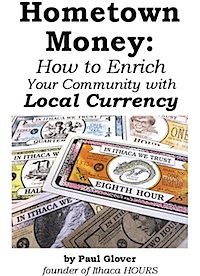 |
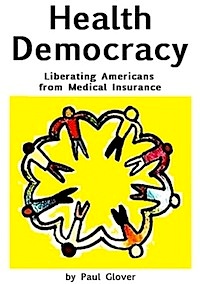 |
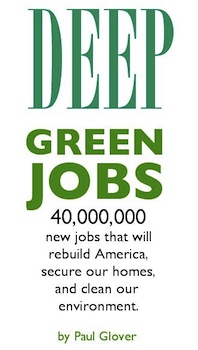 |
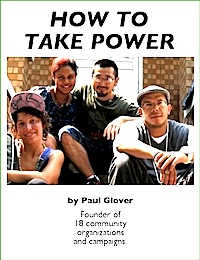 |
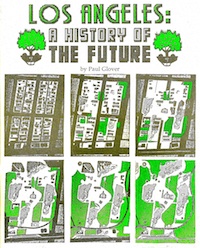 |
 |